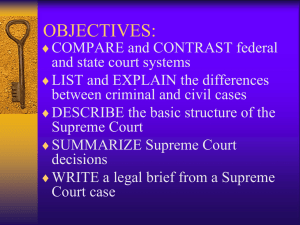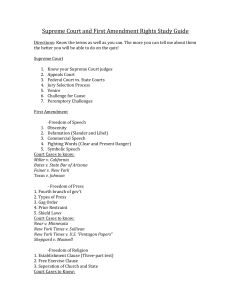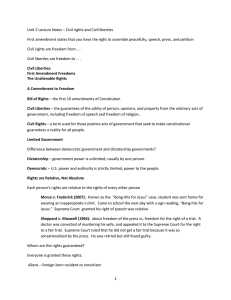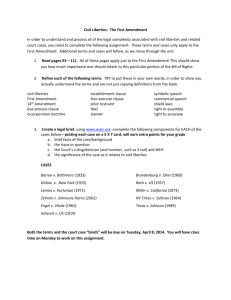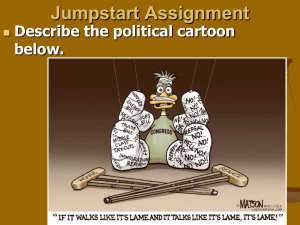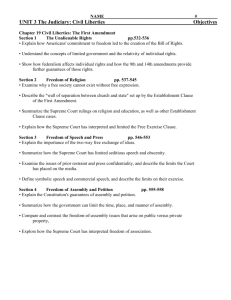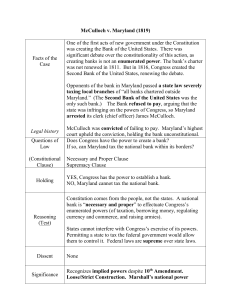Civil Liberties: The First Amendment Freedoms
advertisement
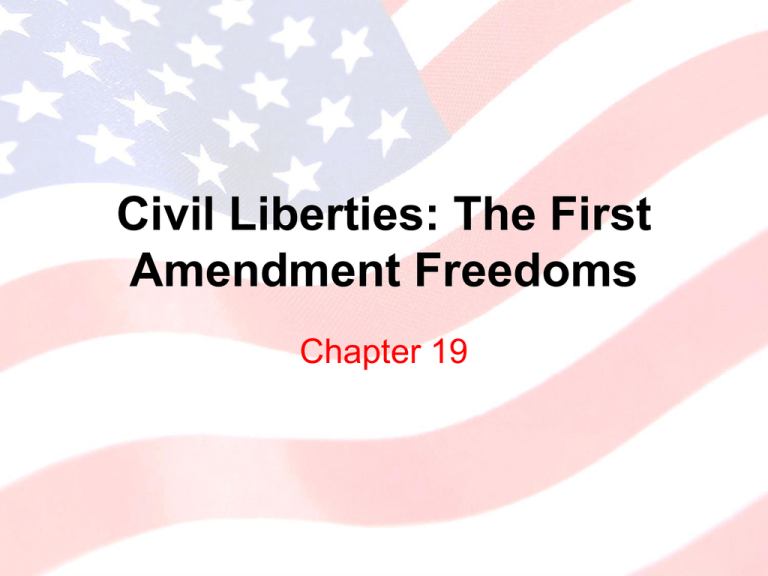
Civil Liberties: The First Amendment Freedoms Chapter 19 The Unalienable Rights Section One • The Declaration of Independence states that people have certain unalienable rights, or individual freedoms that are theirs from birth. The first ten amendments to the Constitution, known as the Bill of Rights, list these rights. • The Constitution guarantees Americans both civil liberties and civil rights, terms that are often used interchangeably. However, civil liberties are protections against government acts while civil rights are positive acts of government that uphold the Constitution. • Each constitutional guarantee of civil liberty limits the power of the government. However, Americans do not have total freedom. They may use their freedoms only in ways that do not infringe on others’ rights. • Most constitutional rights belong to all people living in the United States, including aliens— foreign-born residents or noncitizens. • The Bill of Rights applies only to the National Government. Most of its protections are applied to the State governments by the 14th Amendment’s Due Process Clause. • This clause says that “No State shall…deprive any person of life, liberty, or property, without due process of law.” • Through a series of cases, the Supreme Court has engaged in the process of incorporation by which most of the Bill of Rights’ guarantees have been included in the Due Process Clause. Freedom of Religion Section Two First Amendment to the U.S. Constitution: “Congress shall make no law respecting an establishment of religion, or prohibiting the free exercise thereof; or abridging the freedom of speech, or of the press; or the right of the people to peaceably assemble, and to petition the government for a redress of grievances.” • Free expression, including freedom of religion and freedom of the press, is necessary in a free society. The 1st Amendment guarantees religious freedom through its Establishment Clause and its Free Exercise Clause. • The 14th Amendment’s Due Process Clause protects this freedom from acts of the States. • The Establishment Clause says that “Congress shall make no law respecting an establishment of religions….” Thomas Jefferson described the clause as setting up “a wall of separation between church and state.” • The nature of the “wall,” particularly as it applies to education, is not agreed upon and has therefore been the subject of many court cases. • For example, in 1925 the Supreme Court ruled that a State government could not force parents to send their children to public schools instead of private, churchrelated parochial schools. • In other rulings, the Court has said that public schools may not sponsor religious events. • It has not said, however, that individuals may not pray when and as they choose—in schools or in any other place. • The Free Exercise Clause says that “Congress shall make no law…prohibiting the free exercise [of religion]….” It guarantees to each person that right to believe whatever he or she wishes with regard to religion. • However, no person may act on behalf of those beliefs exactly as he or she chooses. For example, people may not break laws or harm others while practicing their religion. Freedom of Speech and Press Section Three • The 1st and 14th amendments’ guarantees of free speech and a free press protect a person’s right to speak freely and to hear what others have to say. However, no person has the right to libel or slander another. • Libel is the false and malicious use of printed words; slander is the false and malicious use of spoken words. Sedition is the crime of attempting to overthrow or disrupt the government by force or violent acts. • Seditious speech, or the urging of such conduct, is not protected by the First Amendment. • The Supreme Court has limited both seditious speech and obscenity, but it seldom allows the use of prior restraint—the curbing by the government of ideas before they have been expressed. • The media are also subject to federal regulation. For instance, reporters do not have a constitutional right to keep their sources confidential. • However, 30 States have passed shield laws, which give reporters some protection against having to disclose their sources or reveal other confidential information in legal proceedings in those States. • The media of radio and television are subject to more regulation than newspapers because they use the publicly owned airwaves to distribute their materials. • Symbolic speech, or communicating ideas by conduct, has been protected by the Supreme Court. An example of symbolic speech would include wearing a black armband to protest war. • When it is peaceful, picketing, or the patrolling of a business site by striking workers, is one such form of protected conduct. Freedom of Assembly and Petition Section Four • The 1st and 14th Amendments guarantee the right of Americans to assemble, or gather, to share their opinions on public matters. The people may organize to influence public policy and to tell public officials what they think. • They may do this through petitions, advertisements, letters, and demonstrations. Demonstrations, however, must be peaceful. • People do not have the right to block streets or close schools. They may not endanger life, property, or public order. • The government may make rules about the time and place of assemblies and about how they are conducted. These rules must be reasonable and content neutral—that is, the rules may not be related to what might be said at the demonstrations. • Most demonstrations take place on public property because demonstrators want to get the public’s attention. • There is no constitutional right to demonstrate on private property—therefore no one has a constitutional right to hand out political material or ask people to sign petitions there. Some State constitutions, however, do grant that right. • The guarantees of freedom of assembly and petition include a guarantee of association. That means that the right to be with others to promote political, economic, and social causes is guaranteed. First Amendment Supreme Court Cases • Pierce v. Society of Sisters • Everson v. Board of Education • Zorach v. Clauson • Engel v. Vitale • Abington School District v. Schempp • Wallace v. Jaffree • Sante Fe Independent School District v. Doe • Lemon v. Kurtzman • Lynch v. Donnellly • County of Allegheny v. ACLU • Marsh v. Chambers • Reynolds v. U.S. • McGowan v. Maryland • Welsh v. U.S. • Cantwell v. Connecticut • Sherbert v. Verner • West Virginia School Board of Education v. Barnette
